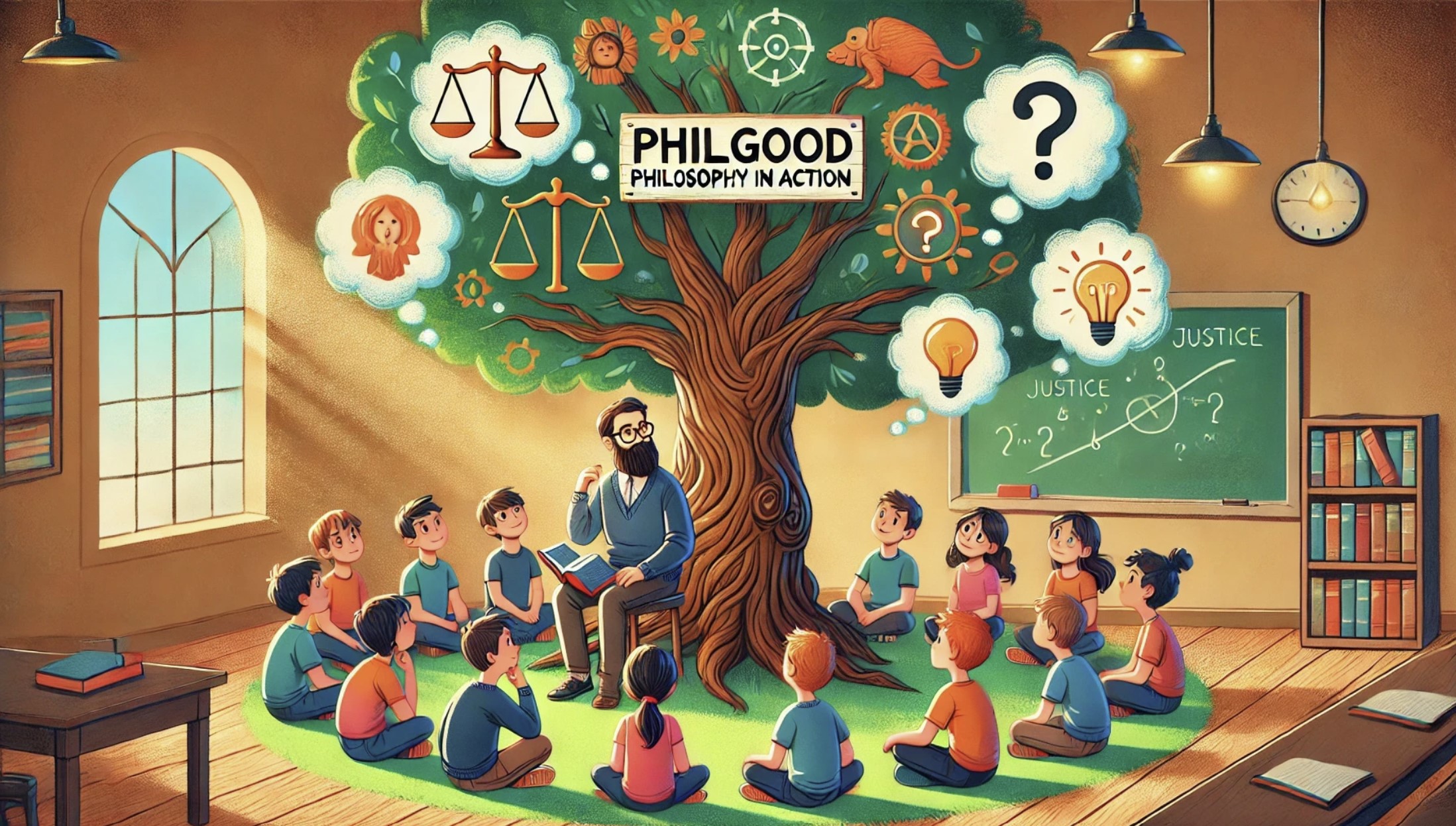Philgood – Philosophy in action
Critical thinking for the new generations
We live in an era where technology and digital media deeply influence everyday life, including that of younger people.
In this context, critical thinking becomes an essential tool for navigating an increasingly complex world. PHILGOOD - Philosophy in Action is a project aimed at introducing philosophy into schools, starting from fourth and fifth-grade primary classes, with the goal of encouraging children to reflect on fundamental topics and promoting an education that values independent thinking, empathy, and dialogue.

Project objectives: an educational revolution
The project has two main objectives:
- Development of critical thinking
Teaching children to question the world around them, guiding them in analyzing and reflecting on ethical, moral, and social issues. Children will be encouraged to explore fundamental concepts such as justice, freedom, happiness, and empathy through engaging and interactive educational tools. - Communication and dialogue:
Training young people to express complex thoughts clearly and effectively, honing their communication skills and the art of dialogue. The proposed philosophical pathways include open discussions, collaborative activities, and moments of introspection to help students develop an authentic and conscious voice.
Innovative educational methodology
The approach used in the project is based on modern and participatory teaching methodologies, such as Socratic dialogue, group work, and reflective learning. Students will be involved in open discussions, stimulated to formulate questions, and explore different perspectives on philosophical, social, and environmental issues. Through practical activities, role-playing, and simulations, the program aims to make learning lively and stimulating.
Why Philosophy in Elementary Schools?
Philosophy is an incredibly powerful tool for shaping thoughtful and critical individuals. Introducing this discipline as early as elementary school allows children to develop self-awareness and an understanding of the world around them, learning to question prejudices and build a personal value system based on principles of respect, inclusion, and understanding of diversity.
The PHILGOOD project is not limited to theoretical education: students will be encouraged to put the philosophical concepts they have learned into practice through creative exercises and personal reflections, thereby building a solid ethical foundation for their future.
Who is it for?
The project is primarily aimed at:
Primary schools
Especially fourth and fifth-grade classes, with ready-to-implement educational programs.
Middle and High Schools:
I offer adaptability to tailor the project to educational pathways specifically designed for different age groups.
Parents and cultural associations:
I also offer training programs for parents and educators who wish to deepen their understanding of the importance of critical thinking and ethical reflection in youth education.
Collaborations with Schools and Cultural Associations
I am available to collaborate with schools, cultural associations, and other educational organizations interested in promoting critical thinking and ethical reflection among young people. Developing philosophical skills not only helps children grow into conscious individuals, but also prepares them to become active and responsible citizens.

"Esploratori di domande" is the first volume in a series introducing 9-10-year-old children to philosophy, exploring themes like identity, truth, justice, and beauty through stories and activities. Each section is dedicated to a philosopher and a key concept, presented in a simple and engaging way:
- Curiosity and Questions – Socrates and the art of questioning: inspires children to explore the world with curiosity.
- Identity and Change – Heraclitus and the continuous evolution of the individual: explores how people change over time.
- Justice – Aristotle and the virtue of justice: invites reflection on what it means to be fair.
- Thought and Consciousness – Descartes and "I think, therefore I am": a journey into the world of thought and self-awareness.
- Truth and Lies – Kant and the morality of truth: reflects on the importance of truth and the question of lying.
- The Meaning of Life – Sartre and the freedom to give meaning to one’s life: what makes life special.
- Courage – Plato and the importance of facing fears: how to do the right thing, even when it’s difficult.
- Beauty – Hume and the subjective concept of beauty: explores how emotions and personal tastes make beauty a unique experience.
- Nature and Interconnection – Spinoza and the bond between humans and nature: discovers the profound connection every living being has with nature.
The book also includes practical activities and open-ended questions that encourage readers to reflect on the concepts explored, turning philosophy into a personal and ongoing adventure. The goal is to develop a mindful curiosity in young readers and the ability to question the world around them.
